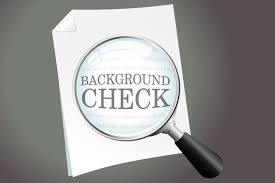
It difficult to check the background of a person either when dating or when the person is a potential employee. It is difficult when to ask directly about a person’s background; for people who are on blind dates, sometimes digging someone’s background can end in a disastrous evening. The same applies to employers; if you hire a person who doesn’t know his/her background, it may have a negative result in productivity of the organization.
Employing a person whose background is unknown to you can lead to: lowered productivity, quality products or services, or directly lead to customer loss. Landing the wrong guy for a job can cost the organization a lot in terms of time and cost spent replacing the person under performing. When selecting a person to employee not only should you consider how they are effective and efficient with their work, but it is also important to select morally upright, ethical and honest person.
About seventy percent of employers say that they perform criminal background which should not only consider the criminal record but may analyse the kinds of charges there may be. Not all criminal records should disqualify one from employment, however, recruits with a theft record bring to the fore issues of trust or someone with assault charges will leave the employer wondering if he or she would be good for the cohesion of a team , checks during the period they are hiring employees to their organization. A survey which was conducted by the group for Human Resources Management showed that from all the organizations which recruit employees, only eighteen percent conduct the check. The eighteen percent are said to conduct research only to the finalist candidates.
Here is a list of dos and don’ts to keep in mind when hiring employees:
Be thorough and broad in your search
When you are hiring an employee concentrate on the expansive range of information provided by the potential employee. Organization should consider the following aspects as they are hiring; the social media, the criminal history, the driving history if the person has a driving license, former and current employment of the potential candidate and also the education background. Most of the companies lose potential candidate for the job my concentrating on one exalt item.
Don’t use the “box”
Most of the countries refuse to consider checking the “box” which has question concerning the criminal records. By refusing to check the “box” they misses a good chance to run a detailed and broad background check.
Ensure that you follow the law
According to how the background is conducted, the employee should have a completed legal form. The form should also inform the person of his/her duties and rights in the organization.
Don’t bend the laws
Employers have many wrong opportunities to conduct background check to potential employees. As the employer you should conduct the background check using the appropriate channels. The employer should liaise with all the governing bodies within the country for the background information.
Do be consistent
As employer ensures that the process is consistence. In case two people apply for the same job ensure that the same background check is done to the both. Equality while choosing should be exercised.
Don’t fail to communicate
If you are conducting a background research to the employee and you find something about the employee, you should make sure you tell them.it may be mistake, therefore it important to talk face to face and hear the truth from them.
Do locate patterns
You should you both positive and negative pattern to evaluate the applicant.
Don’t seek out only the negative
Background check is used to check the negative about an applicant. You should use the background to check also the positive things about the applicant.
Don’t run a limited search yourself
Online doesn’t have all the information about the applicant, you should also search from the license firms.
Do use a professional agency
As an employer ensure you don’t uses the professional agency to conduct the background check since that may violate the federal law.
